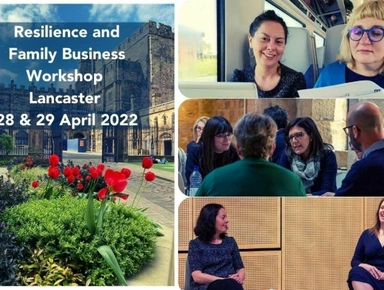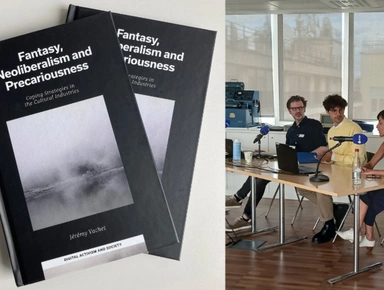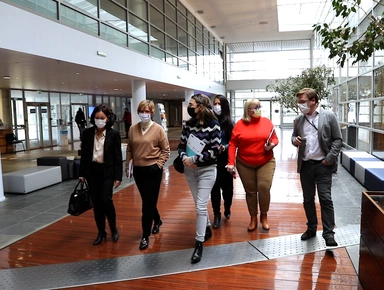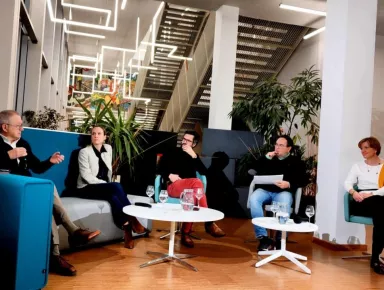The collective thinking behind this new RDV Belle-Boîte began with the observation that companies have become vectors of trust in today's constantly changing world. According to a study by the Institut Jean Jaurès (2022), 82% of French people trust small and medium-sized enterprises (SMEs), while only 41% trust large corporations, and even fewer (31%) trust the media or political parties (18%). In the current context, companies play a crucial social role as trusted third parties. The question is, then, how can corporate communications meet this challenge of trust? What is its role, beyond any purely marketing dimension? What is expected of it in society?
The guests tried to answer these questions:
- Delphine Barbeau, co-founder and director of The New One agency
- Ingrid Baudry, APCOM Co-President and Consulting Director
- Yves-Olivier Lenormand, Leader "Les Entreprises s'engagent - Club de Loire-Atlantique" and Institutional Relations Manager at Airbus Atlantic
- Miruna Radu-Lefebvre, holder of the Chair for Family Entrepreneurship & Society at Audencia
Communication at the service of global corporate strategy
For a long time, communication was considered non-strategic, seen simply as a collection of tools. However, it is now recognized that communication can be a tool at the service of overall corporate strategy and development. Communication can be used to highlight certain important aspects, to work in depth on the company's raison d'être, and to answer the "why" question. If the answer to the "why" is not satisfactory, it may be necessary to change things, even at the level of the company's core business. Beyond its impact on the company's own strategy, communications plays an important role with all its internal and external audiences.
Communication is a co-construction
When we communicate, it may seem that we're in a situation of permanent enunciation and monologue, where the communicator transmits a certain message to those who listen. However, communication theories show us that communication is fundamentally a co-construction. It involves interaction from the outset, and meaning is constantly co-constructed in every communicative exchange. So, while companies may have the impression of sharing a given meaning, what they are actually doing is enunciating propositions of meaning that are interpreted, enriched, transformed and sometimes even hijacked by their audience. This is why it's important to understand that communication is strategic from the outset, and that it is also political, since it involves propositions of meaning that are taken up, transformed and modified by listeners in the context of their own action in the world. It is therefore essential to adopt a posture of constant vigilance, because we are co-enunciators with our audiences. It's a complex game to engage in this fabulous exercise in communication, which carries the company forward.
Communicating also means knowing how to listen
Communicating also means knowing how to listen. The company's mission is not only to share meaningful propositions, but also to listen to its audience, to be sensitive to their reactions and suggestions. It's a question of paying attention to all interactions and transforming them into a narrative for the company's stakeholders. Listening is also strategic for the company, especially at a time when transitions are accelerating. It is crucial to understand these transitions and their effects on the company. This is where the role of the communicator comes into play, as it's all about listening actively to decipher everything that surrounds the company and draw relevant lessons from it.
Communicating with the younger generation
Young people preparing to enter the job market today express a strong need for meaning and identity. When they consider joining a company, what interests them above and beyond the business itself is finding a job that will enable them to give meaning to their work and their lives in general. Young people also seek to develop a personal identity through their professional commitment, as well as identifying with a collective identity represented by the company and the community to which it belongs. The company's commitment to values that convey identity and meaning is therefore becoming very important for the new generations.
In business and communications schools, students are taught to integrate all communication tools and vectors into an integrated communications approach. Metaphors are used to speak of integration and coherence between these different elements and messages. However, it is becoming increasingly difficult to achieve this coherence with the emergence of social networks. Today, the communicator is no longer just the company itself, but all its employees, consumers and stakeholders in general. As a result, the resulting communication is more like an ever-changing kaleidoscope, more or less coherent, rather than a magnificent castle with a meaning magnified and clarified by a single official corporate voice.
Today, communicating is a duty of transparency
Indeed, communicating is becoming a duty of transparency for companies. Everything is now covered by the media, and companies are becoming increasingly open. In this context, the communications function plays a crucial role in ensuring effective long-term transparency for the company. The aim of communication is to enable the company to share the sustainable value it creates. Communications acts as a guarantor of this duty of transparency, ensuring that the company communicates openly, honestly and responsibly. This involves adopting transparent communication practices, assuming responsibility for any errors, providing clear and understandable information, and responding proactively to stakeholders' concerns and expectations.
Belle Boîte is a think tank on the place of business and its role in society, launched by The New One agency, in partnership with Audencia. The event was conceived in collaboration with APCOM and filmed by Kryzalid Films.








